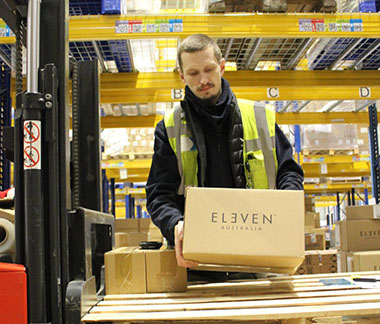How can you optimise your internal industrial logistics?
Industrial logistics is an essential part of ensuring the smooth running of a company and aims to optimise production flows. It responds to three major constraints: technical constraints, market constraints and regulatory constraints. To ensure the activities of sorting, assembly, packaging, transport, storage and handling, industrial logistics relies on proven techniques. According to a study conducted in 2021 by the Ministry of Energy Transition, the logistics sector represents 10% of France's GDP. In constant growth, the field thus generates numerous benefits for companies and actively participates in job creation.
In this context, industrial logistics presents many challenges for any company wishing to streamline its flows and save time. To meet these challenges and optimise production processes, it requires specific management and organisational skills in-house and the integration of high-performance industrial equipment and solutions.
Find out how you can optimise your entire supply chain and ensure good logistics management within your company.
Why optimise your internal industrial logistics?
Optimising industrial logistics to remain competitive
Optimising the logistics chain, also known as the supply chain, meets the need every company has to maintain the highest level of productivity and performance. A good internal logistics organisation has a positive and lasting influence on the profitability and competitiveness of companies by guaranteeing quality development and optimal sustainability in this highly competitive sector.
Benefits of optimised industrial logistics for the company
If optimising industrial logistics is in the interest of a company's competitiveness, the benefits for the management of the entire supply chain are particularly numerous:
- reduction in warehouse storage costs;
- better coordination of logistics activities and processes;
- more competitive delivery times for products and goods;
- better safety and risk management in the warehouse and during transport;
- improved management of flows and exchanges between all supply chain participants;
- increased product traceability and tracking;
- increased customer satisfaction.
How can industrial logistics activities be better managed?
To achieve its productivity objectives and ensure optimal management of its industrial logistics activities, the company will have to be able to meet several challenges and rely on the resources at its disposal.
Define a logistics strategy
The first step in optimising internal industrial logistics is to establish a clear and well-defined logistics strategy. To do this, it is essential to take stock of the activities and processes within the company's organisation. To help you do this, you can use Lean Logistics, a strategy that puts the efficiency of a company first. Lean logistics is an approach that prioritises the operations and activities involved in the organisation of the supply chain and retains only those that add value. By eliminating all non-essential industrial logistics activities, your company will save a considerable amount of time to make room for new, higher quality processes.
However, to ensure that your company achieves the objectives set out in your new logistics strategy, make sure you communicate them to your teams through training, meetings or regular check-ins to ensure overall understanding.
Ensure centralised management of logistics activities within the company
In order to ensure that the company's internal logistics activities are well organised and that unforeseen events, such as stock shortages or customer dissatisfaction, are dealt with in the best possible way, it is essential to appoint a person to be responsible for the production and supply chain. This person will have to respond to emergencies with full knowledge of the techniques, processes and services offered in the warehouse. The role of the logistics manager is crucial for any company that wants to provide relevant and effective solutions to improve the supply chain. As the point of contact for all the logistics teams deployed, the manager will need to have strong management skills in order to collaborate effectively with all the employees.
Prevention of risks and contingencies in the logistics warehouse
In the industrial logistics sector, every company is confronted with daily risks over which it does not always have control:
- order error ;
- delay in delivery of products to customers ;
- loss or theft of goods ;
- breakdown or breakage of industrial equipment ;
- absence of one or more employees.
In order to prevent these risks as much as possible and to ensure that the quality of service remains intact, it is necessary to optimise and systematise warehouse controls on the machines and processes deployed. The implementation of an efficient industrial maintenance service can greatly serve its objectives by offering the company a significant margin of anticipation. Similarly, taking care of the relationship with suppliers and customers by promoting the exchange of information in complete transparency will considerably reduce the risks of human error.
This preventive strategy will lead to a better coordination of logistic processes in the company.
Integrate logistics management tools and software in the warehouse
There are many specialised tools and software to streamline production activities within a logistics warehouse.
> The Warehouse Management System (WMS)
As a warehouse and stock management tool, the WMS ensures continuous control of goods movement operations and stock status at any given moment. It allows tasks to be classified according to the products stored.
> The Transport Management System (TMS)
As a tool for planning routes, preparing orders and invoicing goods transport, the TMS is a major ally in optimising expenditure and organising the movement of packages and products. The result is better management of transport operations and an uninterrupted supply chain.
> Enterprise Resource Planning (ERP)
ERP systems are integrated solutions for managing all processes in a company:
- logistics operations ;
- business accounting ;
- personnel management ;
- quality control ;
- maintenance.
The ERP software harmonises the monitoring of production and of each logistical operation carried out in the warehouse.
> The rise of new technologies in industrial logistics
Industry 4.0 has gradually taken over logistics organisations in France to provide an environmental response, but also to make logistics management operations more fluid. Among these innovations, here are some worth mentioning:
- Automatic guided vehicles (AGVs);
- clean vehicles and temperature control ;
- high-definition surveillance cameras;
- high performance sorters ;
- drones ;
- augmented reality.
Viaposte helps you optimise your industrial logistics
As your partner of choice for industrial logistics, Viaposte can help you organise, prepare, process, sort and transport all your goods. By mobilising the best teams and drawing on the most innovative tools, we make it possible to optimise your logistics from A to Z, whatever your needs. Entrust us with your logistics and keep your company at the height of its productivity!







